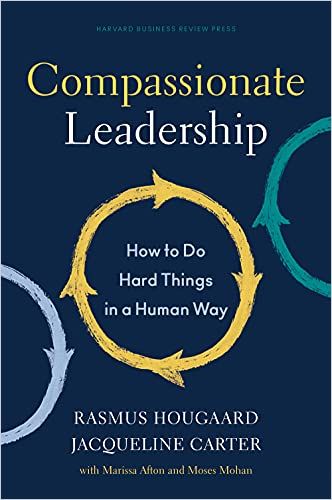Rasmus Hougaard and Jacqueline Carter’s worthwhile, fact-based manual helps leaders build compassion, wisdom, understanding and mindfulness.

Enlightened Leaders
Authors and consultants Rasmus Hougaard and Jacqueline Carter detail how to carry out decisions that will change other peoples’ lives without sacrificing your humanity. They explain that today’s leaders must learn to handle the toughest chores – such as laying off employees – with “caring transparency,” “wise compassion” and sensitivity – and then they tell you how.
Wisdom and Compassion
Hougaard, founder and CEO of Potential Project and author of The Mind of the Leader, and Carter, Potential Project’s North American director, recognize that leaders often must make difficult and unpopular decisions. Leaders may have to eliminate positions, cancel projects or criticize employees for sub-par performance. Leaders have always faced such challenges, but today – when employees expect a positive work experience along with their paychecks – leaders also must demonstrate sensitivity and diplomacy, even when they are lowering the boom.
Compassion is the intention to be of benefit to others. Compassion is not about pleasing others and giving them what they want.Rasmus Hougaard and Jacqueline Carter
Leaders must carry out their responsibilities without compromising their humanity or treating their employees inhumanely. You can make hard choices in the line of duty and remain a caring human being. However, honoring your humanity as you exercise leadership requires demonstrating wise compassion, even in tough situations.
Potential Project’s ten years of research reflects the value of wise compassion. In addition to interviewing 350 CEOs and chief human resource officers, Potential Project compiled data from 15,000 leaders and 150,000 employees representing 5,000 organizations worldwide. This comprehensive research indicates that wise compassion enables leaders to rise more readily through the ranks and to influence their employees’ mind-set and productivity in positive ways.
Leaders who combine wisdom and compassion generate outstanding results. However, effective leaders must bear in mind that wisdom by itself can be cruel, just as compassion without wisdom can be ineffective and patronizing.
“Universal Compassion”
Management and leadership are distinct, separate practices demanding distinct and separate skill sets, mind-sets, attitudes and approaches. Management focuses on processes and control. Leadership focuses on acknowledging and listening to others, formulating strategy and helping people execute that strategy. Traditional management training typically overlooks the human component and the importance of building trusting relationships.
Everyone has an instinct for compassion from birth. This innate desire to help others enabled the human race to survive and thrive, to build communities and to develop morality. Hougaard and Carter reveal that people actually must exert greater “cognitive effort to be selfish” than to be unselfish.
“Universal compassion,” the genuine desire for other people to be happy, helps leaders understand their employees, particularly those with whom they may not agree or get along. Showing sensitivity to the plight of your fellow human being broadens your perspective and makes you a more effective, attentive leader.
Heartless or Heartfelt
The way leaders choose to deal with crises like the pandemic, economic downturns and large-scale layoffs reveals their compassion and empathy. Tough times often bring out a leader’s true nature.
For example, when COVID started spreading in April 2020, the electric scooter startup Bird, then valued at $2.77 billion, fired 400 workers – 40% of its employees – and told them about it via a recorded online message. Showing a complete lack of compassion, Bird turned off its fired staffers’ computers instantly following the layoff notification.
Conversely, Airbnb founder and CEO Brian Chesky displayed care and sensitivity when he eliminated 1,900 jobs to save his company. He established a program to help affected employees find other work, allowed them to keep their computers and provided generous severance pay. Chesky wrote to his entire workforce to say he was sorry and to thank the employees he had to let go.
How you lead through hard times defines what people will remember about you and your leadership.Rasmus Hogaard, Jacqueline Carter
Leaders must recognize the distinction between empathy and compassion – though both are laudable traits. Empathy means you take on other people’s actual feelings. Compassion goes a step further. You not only identify with other people’s emotions, you commit to helping them. Be aware, however, that too much empathy can prevent you from taking necessary action. Leaders must be empathetic regarding their employees’ humanity while leading their companies with wise compassion and practicality, which inevitably mean making tough decisions.
Layoffs are one of the necessary evils a leader may face. Telling people they are out of work is hard and unpleasant, but it can be appropriate and ethical – particularly in the long run – if it saves the company or preserves a greater number of jobs. Compassionate leaders base their decisions on what benefits the “greater good.” Leaders who misuse this power for self-protection and ego-fulfillment are treading “morally shaky ground.”
Mindfulness
Leaders who practice mindfulness are “more present” and have a higher degree of wisdom and compassion. Mindfulness is a powerful counterbalance to the obligations and distractions leaders face. Wise leaders recognize that remaining present requires a concerted, consistent effort.
Potential Project’s data from thousands of leaders worldwide indicates that leaders are distracted nearly 40% of the time at work. Achieving a clear mind is a huge challenge, particularly when information, alerts and messages continuously stream in from electronic devices. Diversions hamper your ability to concentrate on the issue or person before you, so a lack of concentration leads to less effective leadership.
Attaining greater mindfulness is possible through training and practice.Start by sitting quietly and being aware of your thoughts. Don’t analyze or judge them. Your thoughts do not define you as a person. They are fleeting and inconsequential – unless you decide to act on them.
We have all experienced moments when we are unkind, selfish and self-centered. But this does not make us bad people.Rasmas Hougaard, Jacqueline Carter
When you are not intentionally engaged in a mental task, your Default Mode Network (DNM) takes over, scattering your thoughts and increasing your anxiety. Hougaard and Carter believe the Default Mode Network explains why good people sometimes behave selfishly.The average person spends roughly half of his or her time in this “wandering mental mode,” which compromises productivity and generates stress. Practicing mindfulness helps you combat DMN and become a more aware, attentive and compassionate leader.
Wisdom in Practice
Hougaard and Carter demonstrate the wise compassion they describe, revealing their tactical intelligence in the process. Before offering their arguments for leading with greater empathy and kindness, the authors provide compelling statistics from their rigorous research. Thus, because they understand their audience, Hougaard and Carter don’t ask leaders to take their advice on faith; they offer facts first, then guidance based on those facts. Their offering is timely, since workplace sensitivity up and down the command structure is growing increasingly important. Hougaard and Carter synthesize several current approaches to greater mindfulness and provide a thorough guide to the world of enlightened leadership.













